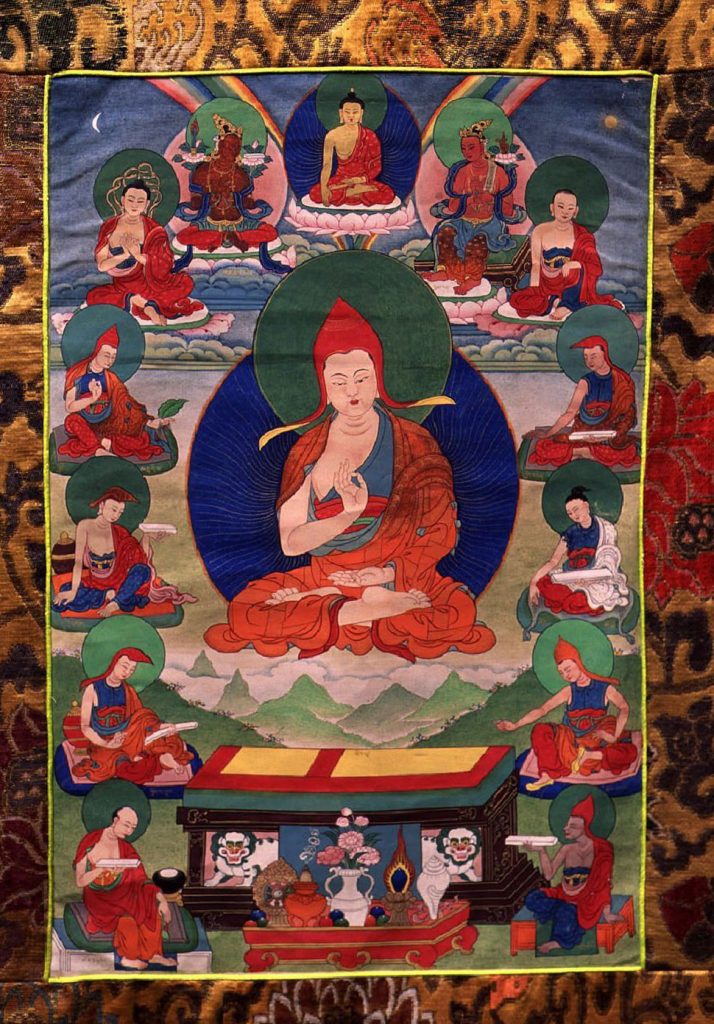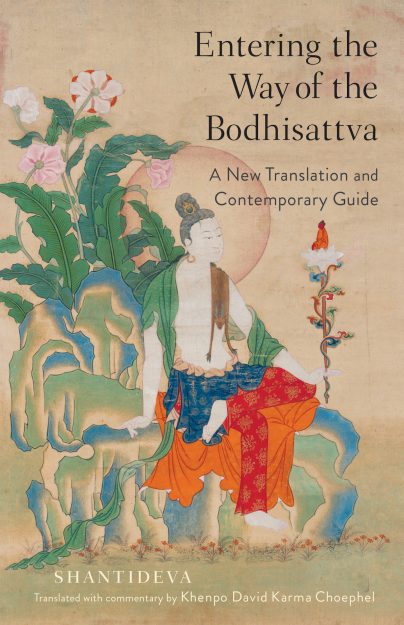In the early 8th century, the Indian Buddhist monk Shantideva composed a text at the Nalanda monastic university that would prove essential to the formation of Mahayana Buddhism, particularly in the ways it developed in Tibet. His seminal work, known in Sanskrit as the Bodhicaryavatara (in English, Introduction to the Bodhisattva’s Way of Life), identified the reasons a person should aspire to become a bodhisattva, a being who strives to become a buddha but pursues the liberation of all sentient beings before their own; how to take the bodhisattva’s vow; and, perhaps most importantly, how to keep it.
This year the accomplished translator Khenpo David Karma Choephel breathes new life into Shantideva’s masterpiece with a new translation and commentary informed by decades of study and practice in the Tibetan Buddhist Karma Kagyu lineage. What follows is an excerpt from the book, Entering the Way of the Bodhisattva (Shambhala; April 13, 2021), that focuses on discipline, one of the Buddhist paramitas, or transcendent qualities. Choephel also shares his commentary on the verses.
—Gabriel Lefferts, Managing Editor
1. All those who wish to keep the precepts
Should concentrate and guard their minds.
If you do not protect your mind,
You won’t be able to keep the precepts.
2. An untamed elephant amok
Does not create as much harm here
As letting the elephant of mind
Run loose will cause in the Incessant.
3. The elephant of mind tied tight
With ropes of mindfulness all round,
All dangers will amount to naught;
All virtues will come into your hands.
4. All tigers, lions, elephants,
Bears, snakes, and enemies,
The keepers of the beings in hell,
The dakinis and rakshasas—
5. By binding just this mind alone,
All of these will be bound.
By taming just the mind alone,
All of these will be tamed.
6. For he who spoke the truth has taught
That everything we fear
And sufferings beyond all measure
Originate from mind.
7. Who is it that specifically made
The weapons of the hells?
Who made the ground of burning iron?
Whence come the lovers in hell?
8. The Sage has said that all of these
Arise from wicked thoughts.
Therefore there is in the three worlds
No danger other than mind.
9. If ridding the world of poverty
Made generosity transcendent,
There are still paupers, so how could
The past protectors have transcended?
10. The wish to give all your belongings
And the results to everyone
Is taught to be transcendent giving,
And therefore that is mind itself.
11. And where could fish, et cetera,
Be sent where they would not be killed?
Discipline’s taught to be transcendent
From gaining the intent to abstain.
12. How could one kill belligerent beings
Who are as infinite as space?
Vanquishing this one angry mind
Is like defeating all those foes.
13. How could there be sufficient leather
To cover the earth entirely?
With just the leather for my soles,
It is as if the whole earth’s covered.
14. Likewise, although I am unable
To keep external things at bay,
I’ll keep this mind of mine in check—
What need to ward off anything else?
15. Even with body and speech, results
Of feeble conduct are not like
The fruit of rousing one clear thought—
Rebirth in such as Brahma’s Realm.
16. No matter how long they are practiced,
All liturgies and austerities
Are futile, said the knower of suchness,
If something else distracts the mind.
17. Those who don’t know this secret of mind—
The sublime, paramount of dharmas—
Want to gain joy and end suffering
But wander to no avail or end.
18. Thus I will grasp and protect well
This mind of mine. This discipline
Of guarding mind aside, why bother
With multifarious disciplines?
19. Like those who in a boisterous crowd
Concentrate and take care of their wounds,
Those in the crowds of evil people
Should always guard the wound of mind.
20. If you are careful of a wound
From fear of its slight, minor pain,
Why not protect the wound of mind
From fear of crushing mountains in hell?
21. Living by conduct such as this,
A steadfast monk who keeps his vows,
Whether in crowds of evil people
Or among women, will not fall.
22. It would be better to lose my things,
Life, limbs, respect, or livelihood;
Better that other virtues lapse
Than ever my intent diminish.
23. I join my palms in prayer and urge
All those who wish to guard their minds:
With all your efforts, please protect
Your mindfulness and your awareness.
–Shantideva
Discipline in Buddhism means keeping vows—the vows that primarily address conduct of body and speech such as the five lay precepts and monastic vows, or the vows that address motivation and ways of thinking, like the bodhisattva vow. But keeping vows requires guarding the mind, which motivates all our actions (verse 1).
The tools the bodhisattva uses to guard the mind are mindfulness and awareness. The word mindfulness is used broadly in English, but in traditional Buddhists texts, it refers to remembering what you should do and what you should not. In meditation, this would mean remembering the specific practice technique such as counting the breath, but in this context, mindfulness is remembering what the bodhisattva vow allows and what it prohibits. Continually applying mindfulness brings awareness, which means simply knowing what is happening with your body, speech, and mind—being aware of whatever you are doing, saying, or thinking and not acting mechanically while your thoughts wander elsewhere. As the Prajnaparamita in One Hundred Thousand Stanzas, another important Mahayana text, says,
When a bodhisattva mahasattva is going, they know, “I am going.” When standing, they know, “I am standing.” When sitting, they know, “I am sitting.” When lying down, they know, “I am lying down.” When they have a pleasant or unpleasant physical feeling, they know it as it is.
The fundamental reason for developing mindfulness and awareness is to be able to control the mind and consequently our physical and verbal actions. According to Buddhist teachings on karma, most misfortunes and dangers we encounter result from our past actions, and karmic actions are always preceded by an intention in the mind. For this reason, all wrongs depend upon the mind. An uncontrolled mind can incite evil actions that would cast us into the lowest hell, the Incessant (verse 2), while a mind held in check by the rope of mindfulness will restrain us from such actions and instead prompt us to act virtuously, protecting us from harm (verse 3). Even dangerous animals, enemies, demons such as dakinis (female demons who eat human flesh), three rakshasas (human-eating monsters who can be either male or female), and so forth arise from karma, our actions. Our karma originates in our volitions, which are mind, so controlling our mind will protect us from future danger (verses 4–5). Taming our mind will not necessarily save us if we are attacked by a tiger, lion, or elephant (although there is a story of the Buddha taming a rampaging bull elephant in rut merely by his calming presence). Instead, it will prevent us from accumulating the karma that would lead to such dangers in the future.
Shantideva next teaches that everything—both positive and negative—depends upon the mind. In verses 6–8, he explains that the Buddha taught in the sutras that all sufferings arise from the mind, focusing on the sufferings of the hells. The appearances of the burning ground in hell or the lovers who seduce hell beings to cross through a forest only to be impaled on the long iron thorns of the shalmali trees were not made by a creator god. Instead, acting out of a wicked thought such as anger plants a poisonous seed in the mind that later, when conditions are right, rearises as the deluded perceptions of hell (verse 8).
Just as all faults depend upon the mind, so too do all qualities, including the six paramitas, or transcendences—generosity, (verses 9–10), discipline (verse 11), patience (verses 12–14), diligence (verse 15), dhyana or meditation (verse 16), and prajna (verse 17). What makes these six transcendent is not the external appearance or effect (eliminating poverty in the world or protecting all sentient beings from danger, for example) but the bodhisattva’s intention—his or her willingness to do anything in order to avoid doing harm. The “one clear thought” mentioned in verse 15 refers to a story from the Mahaparinirvana Sutra of a mother and daughter who were carried away by a flood. Each thought of the other with great love and prayed, “I hope she doesn’t die!” but they both perished together. The result of their clear and loving thoughts was that both were born in Brahma’s Realm, one of the abodes of the gods.
This portion of the chapter concludes with Shantideva reiterating that because the mind is the basis of everything good or ill, nothing is more important than gaining control over the mind (verses 18–21). Verse 21 is addressed specifically to his audience of celibate monks, but the advice applies to nuns and lay practitioners as well. Just as a monk who is mindful and aware will have no difficulty among people who might tempt him to commit an evil act or for whom he feels sexual attraction, guarding the mind with mindfulness and awareness is of utmost importance for anyone who keeps any vows, whether monastic, lay, or bodhisattva.
♦
From Entering the Way of the Bodhisattva: A New Translation and Contemporary Guide by Shantideva, translated by Khenpo David Karma Choephel © 2021 by David Karma Choephel. Reprinted in arrangement with Shambhala Publications, Inc. Boulder, CO. www.shambhala.com
Thank you for subscribing to Tricycle! As a nonprofit, we depend on readers like you to keep Buddhist teachings and practices widely available.

